英语人教版八年级下册Writing. 教案
- 格式:doc
- 大小:34.00 KB
- 文档页数:7
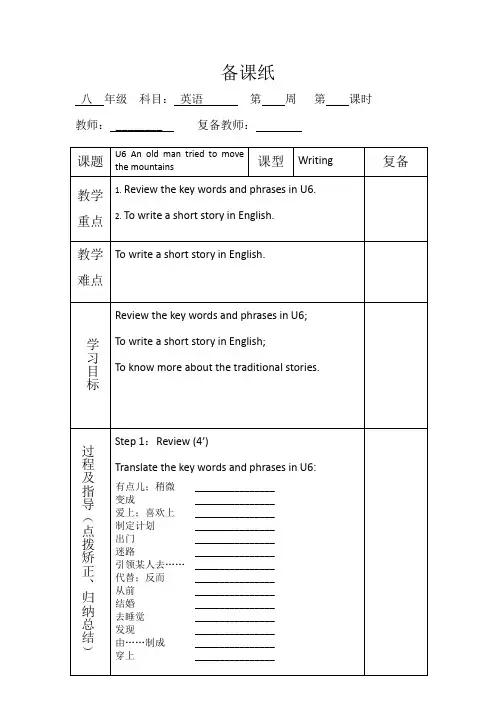
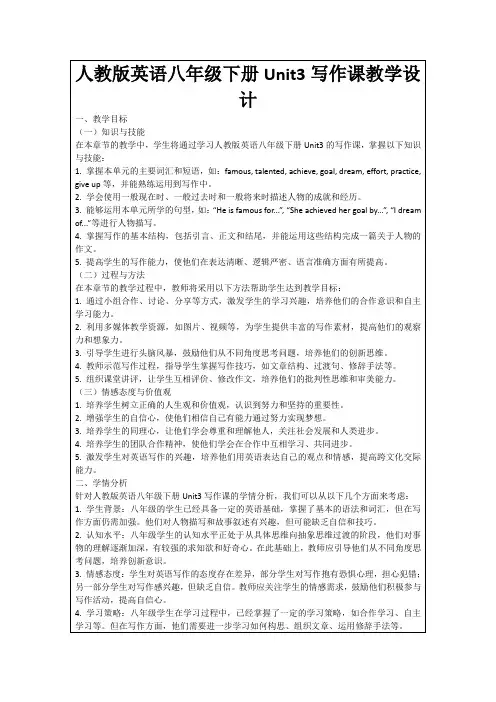
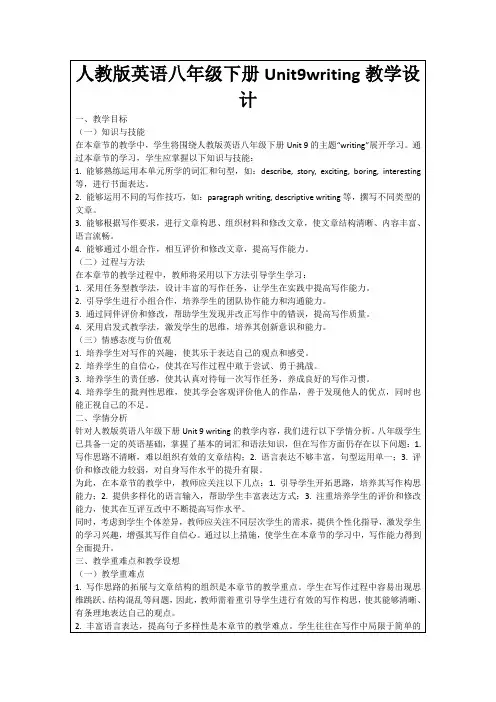
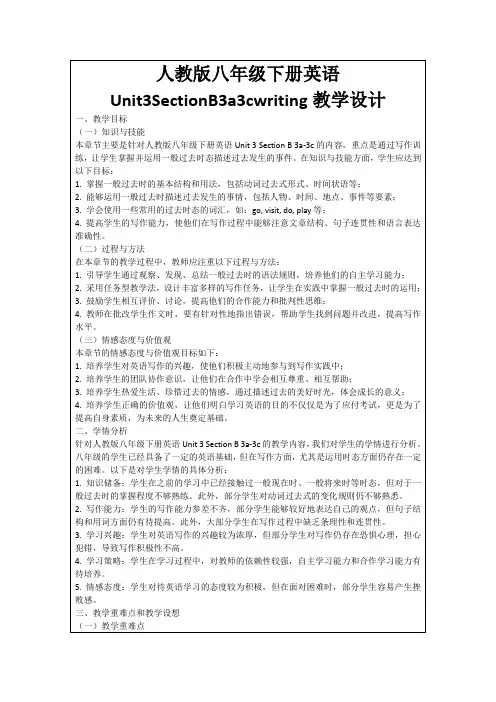
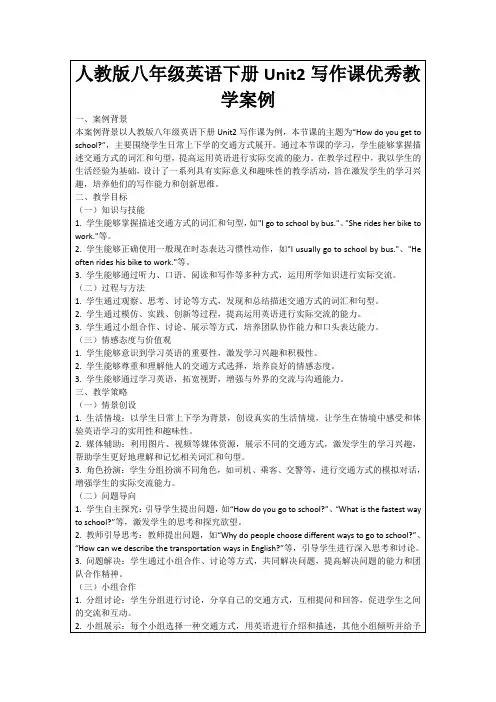
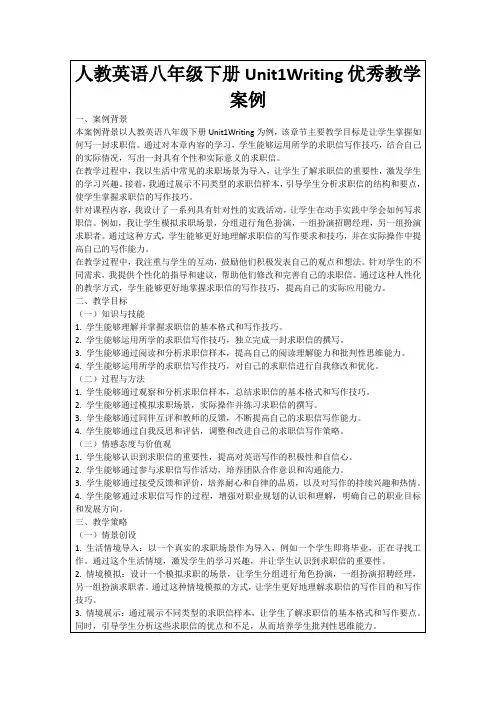
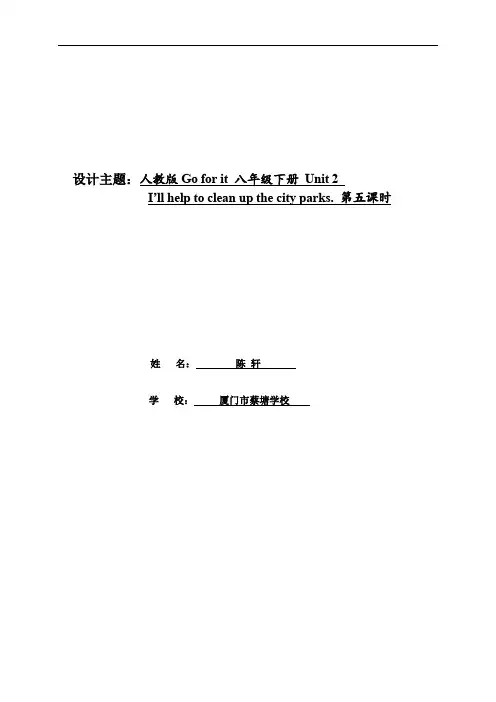
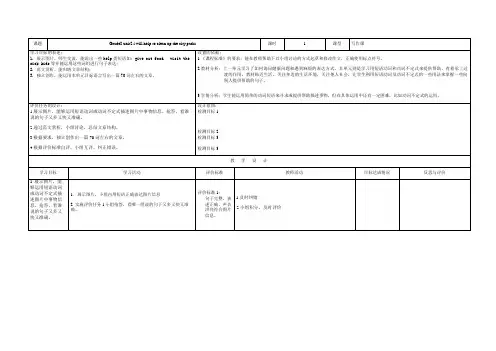
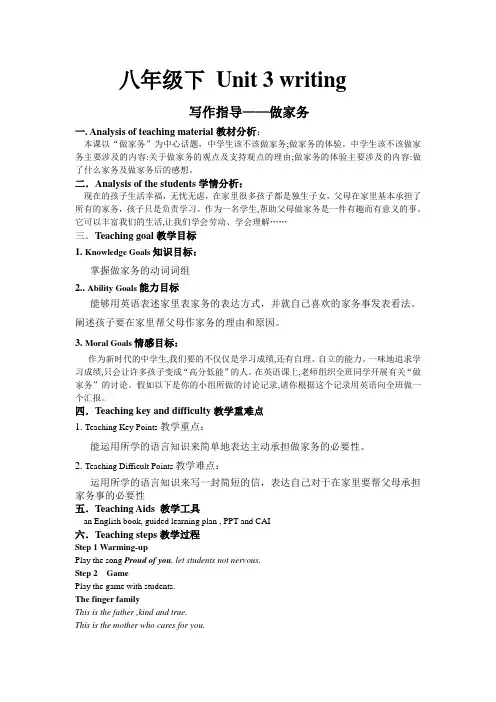
八年级下Unit 3 writing写作指导——做家务一. Analysis of teaching material教材分析:本课以“做家务”为中心话题,中学生该不该做家务;做家务的体验。
中学生该不该做家务主要涉及的内容:关于做家务的观点及支持观点的理由;做家务的体验主要涉及的内容:做了什么家务及做家务后的感想。
二.Analysis of the students学情分析:现在的孩子生活幸福,无忧无虑,在家里很多孩子都是独生子女,父母在家里基本承担了所有的家务,孩子只是负责学习。
作为一名学生,帮助父母做家务是一件有趣而有意义的事。
它可以丰富我们的生活,让我们学会劳动、学会理解……三.Teaching goal教学目标1. Knowledge Goals知识目标:掌握做家务的动词词组2.. Ability Goals能力目标能够用英语表述家里表家务的表达方式,并就自己喜欢的家务事发表看法。
阐述孩子要在家里帮父母作家务的理由和原因。
3. Moral Goals情感目标:作为新时代的中学生,我们要的不仅仅是学习成绩,还有自理、自立的能力。
一味地追求学习成绩,只会让许多孩子变成“高分低能”的人。
在英语课上,老师组织全班同学开展有关“做家务”的讨论。
假如以下是你的小组所做的讨论记录,请你根据这个记录用英语向全班做一个汇报。
四.Teaching key and difficulty教学重难点1. Teaching Key Points教学重点:能运用所学的语言知识来简单地表达主动承担做家务的必要性。
2. Teaching Difficult Points教学难点:运用所学的语言知识来写一封简短的信,表达自己对于在家里要帮父母承担家务事的必要性五.Teaching Aids 教学工具an English book, guided learning plan , PPT and CAI六.Teaching steps教学过程Step 1 Warming-upPlay the song Proud of you, let students not nervous.Step 2GamePlay the game with students.The finger familyThis is the father ,kind and true.This is the mother who cares for you.This is the brother,so big and tall.This is the sister who plays with her ball.This is the baby,pet of them all.See the whole family ,big and small.Step 3 Presentation1. Watch the photos and ta lk about them “W hat does he do every day?’ and learn thesephrases: do chores, do the dishes, make the bed, take out the rubbish, fold the clothes. Step 4DiscussionDo you think children should do some chores at home?Why or why not?Discuss this with aWrite the students’ answers on the blackboard.Step 5 Writing(设计学生使用语言的情景,培养学生综合语言运用能力。
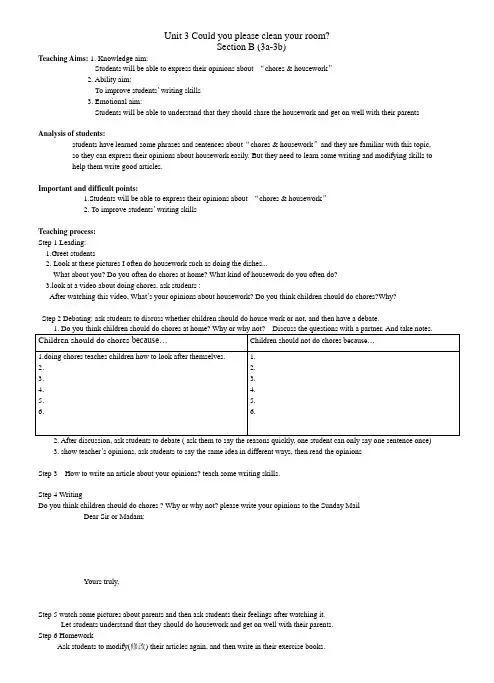
Unit 3 Could you please clean your room?Section B (3a-3b)Teaching Aims: 1. Knowledge aim:Students will be able to express their opinions about “chores & housework”2. Ability aim:To improve students’ writing skills3. Emotional aim:Students will be able to understand that they should share the housework and get on well with their parentsAnalysis of students:students have learned some phrases and sentences about“chores & housework”and they are familiar with this topic, so they can express their opinions about housework easily. But they need to learn some writing and modifying skills to help them write good articles.Important and difficult points:1.Students will be able to express their opinions about “chores & housework”2. To improve students’ writing skillsTeaching process:Step 1 Leading:1.Greet students2. Look at these pictures I often do housework such as doing the dishes...What about you? Do you often do chores at home? What kind of housework do you often do?3.look at a video about doing chores, ask students :After watching this video, What’s your opinions about housework? Do you think children should do chores?Why?Step 2 Debating: ask students to discuss whether children should do house work or not, and then have a debate.2. After discussion, ask students to debate ( ask them to say the reasons quickly, one student can only say one sentence once)3. show teacher’s opinions, ask students to say the same idea in different ways, then read the opinionsStep 3 How to write an article about your opinions? teach some writing skills.Step 4 WritingDo you think children should do chores ? Why or why not? please write your opinions to the Sunday MailDear Sir or Madam:______________________________________________________________________________________________________________________________________________________________________________________________________________________________________________________________________________________________________________________________________________________________________________________________________________________________________________Yours truly,__________Step 5 watch some pictures about parents and then ask students their feelings after watching it.Let students understand that they should do housework and get on well with their parents.Step 6 HomeworkAsk students to modify(修改) their articles again, and then write in their exercise books.。
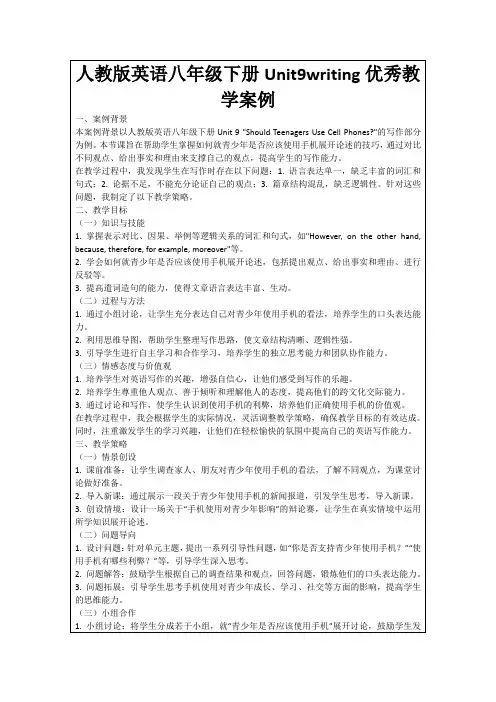
Teaching PlanWritingTeacher:Ⅰ. Teaching Aims:1.Be able to talk about how to keep healthy in our daily life.2.Learn to prepare and use the linking words to write a better composition abouthow to keep healthy.Ⅱ. Main & Difficult Points:Be able to improve students’ ability of writing by analyzing and discussion.Ⅲ. Teaching Method:Using the multimediaⅣ. Teaching Procedures:Step 1. Leading in (Waming-up)Teacher will introduce the tools that will be used in this class and divide them into eight groups and ask students to answer one question: Which is the most important to you?Students are asked to use the responder to choose. Then present the result on the screen and pick some students to tell the reason.Step 2. Before-writingTask 1.Introduce the topic of this lesson and show some pictures to make students judge whether it is healthy or unhealthy.Task 2. Make students discuss in groups of six about how to keep healthy. Then report the result to the class.Students should write down their advice on the ipad and send it to the screen. In this way, every student can enjoy the advice of each group.Task 3. Teacher lead students to summarize the way to keep healthy, and draw a mind-map.Then present some details about good eating habits and living habits to make students to make sentence by using different stuctures. Here students will have a group competition. Who wants to answer questions shoud get the chance by pressing the responder as quickly as they can.Step 3. Writing-analysisTeacher questions students how to make the sentence into a better composition about how to keep healthy. Students can have a discussion, then share their ideas.Then the teacher summarize the requirements.●Good framework(结构)●Better sentences(好的语句)●Correct grammar(语法), spellings(拼写)●Tidy writing(整洁的书写)●Better logic (逻辑)Task 1 Discuss the following questions with students:What is the framework of the composition? How many passages are there in total?What should we write in each paragraph.Teacher write down the result on the blackboard.Task 2 How can we better the sentences?Simple sentences can be put into complex sentences (复合句) for better.Better sentence patterns(句型) can be used to improve the writing.Find some proverbs on health.Task 3 How can we better the logic ?Then do some exercise to know the importance of using linking words.Step 4 Write and ImproveStudents will be asked to write a composition about how to keep healthy. Then share it with group members and modify the composition according to writing standard. Then choose one to take a photo with the ipad and send it to the screen.Step 4 Show timePick some groups to present the composition and explain why it is good.Step 5 EvaluationSelect the winner group and ask the other students to congratulate this excellent group.Step 6 Homework1.Polish(修饰) your article with your partner.2.Take some exercise with your parents.。
Section B3a-3bWriting一、教学目标:1. 语言知识目标:1) 复习巩固所学的有关表达学生遇见的日常问题的词汇和句型、并能在书面表达中正确运用。
2)能根据提供的热点话题完成写作2. 情感态度价值观目标:在讨论学生热点问题中让学生们表达内心的实际困惑和发表自己的意见和见解形成良好的学习生活习惯和正确处理问题和困难的技能二、教学重难点1. 教学重点:1)能根据话题熟练运用所学词汇句型进行书面表达。
2)列举问题和建议2. 教学难点:能根据话题熟练运用所学词汇句型进行书面表达。
三、教学过程Ⅰ.Pre-writing1. Greet the Ss as usual.2. Two tasks.Task1Discuss daily problems(1 )study too much no enough sleep.(2) too much homework no free time to do things I like(3) Not to hang out with my friends(4) too many after-school classes(5 )got into a fight with my best friend.Other problemsTask2 Give reasonable suggestions(1)I have no free time to do …You should talk with your parents.(2)Why don’t you go to a movie this evening?Why don’t you discuss with teachers to have fewer exams(3)Why not read some interesting books at home?(4).It’s better for you to talk to your parents.(5)You could say sorry to himⅡ. While-Writing1. Show students writing task “Whether students should go to the after-school classes”Agree(1)“After-school classes can help kids get into a good university.”(2). “I want my child to be a successful person.”(3) “It’s good for children to start learning from a young age.”(4). It’s good for children`s future(5). Many great peo ple learn things from a very young age. If the child is gifted, it’shelpful to learn it from a young ageDisagree(1).It makes a bad difference to one’s life. Even though one goes to a good university, hemay still can’t be successful(2). All these activities can cause a lot of stress for children.Kids should have time to relax and have fun(3).Parents shouldn`t always compare their children with other children.I believe it’s better to let the kids be kids2. Students give their opinions : at least 3 tips /ageement and disagreement Examples:DisagreeDear …,I don’t really agree with …because …Although some parents are right about …, I think children should …In my opinion, it is important for children / parents to …I believe it is bett er if children / parents … so that …Perhaps children / parents should / could …If children …, they will …Agree•Dear …,•I agree with …•because …•In my opinion, it helps to …it makes kids…It`s good for…It`s important to…3. Students practice writing in groups.and shareAfter students have finished their writing, let them read their writing. Then show it to all the students and corret it.Ⅲ. Poset-writing1.summarize2.homework板书设计:。
Unit 2 I’ll help to clean up the city park s.Section A 1 (1a-2d)一、教学目标:1. 语言知识目标:1) 能掌握以下单词:clean up, city, cheer, cheer up, give out, volunteer, notice, used to, lonely,能掌握以下句型:① You could help to clean up the city parks.② We should listen to them and care for them.2) 能了解以下语法:情态动词could, should的用法;用should或could提出建议并对别人的建议作出评价。
如何表达主动提供帮助。
2. 情感态度价值观目标:在授课过程中渗透助人就是助己,助人收获快乐的情感目标,使学生在谈论如何为别人提供帮助的对话中能意识到尽己所能,帮助他人,乐于奉献是一种良好的品德,培养学生为他人着想,热爱公益事业,乐于助人的优良品质。
二、教学重难点教学重点:1) 掌握这些短语动词的构成和用法:clean up, city, cheer, cheer up, give out,volunteer, notice, used to, lonely2) 学会提供帮助的基本句型:I’d like to work outside.I’ll help clean the city park.You could give out food at a food bank.教学难点:学会提供帮助的基本句型三、教学过程Step 1 Warming up播放学生志愿者进行义务帮助别人的活动视频,通过询问他们问题来引导学生了解社会上一些志愿者们进行的活动。
T: Who are they?S:They’re volunteers. They usually volunteer to help others.T: How could we help people?S1: We could clean up the parksS2: We could help sick people in the hospital.S3: We could help plant trees.…Step 2 New words1. city n.城市e.g. The library is in the north of the city. 图书馆在城市的北部。
2. notice n. 公告牌;通告;布告e.g. Please read the list on the notice board. 请读公告板上的名单。
3. sign n.标志;信号e.g. Look around, we could see no sign of life.环顾四围,我们看不出一点生命的迹象。
4. volunteer v. 义务劳动,自愿做volunteer to do sth. 义务自愿做某事e.g. Many people volunteer to work on the farm. 很多人志愿到农场去工作。
5. clean up 打扫;清除e.g. The students take turns to clean up their campus. 学生们轮流打扫校园。
6. give out 分发;散发e.g. Please help me give out food. 请帮我将吃的发下去。
7. cheer v.欢呼; 喝彩e.g. Cheer up. The news isn’t too bad. 振作起来,消息还不算太坏。
8. lonely adj.孤独的;寂寞的e.g. I don’t feel lonely because I made new friends here.我不觉得孤独因为我交了新朋友。
9. used to 曾经,过去e.g. Jack used to be short, but now he’s tall. 杰克过去很矮,但现在高了。
Step 3 Discussion1. 1a. Look at the ways you could help others. Then list other ways.2. Ss discuss with their partners and write the ways one could help others:① Help to plant trees by the river.② Help to clean up the city park.③ Visit the old people in the old people’s home.④ Help young kids to learn English.Step 4 Listening1. T: Tell Ss to read the sentences in the chart. Make sure they know the meaningof the sentences.2. 1b. Play the recording for the Ss to listen and number the ways the boy and girlcould help others.(Key: 3, 2, 4, 1)Step 5 Pair work1. Let Ss read the conversation in the picture.2. 1c. Use the information in the chart of 1b to make other conversations.A: I hope to work outside.B: You could help to clean up the city parks.……3. Let some pairs act out their conversations.Step 6 Listening1. 2a:T: A group of students are planning a City Park Clean-up Day. Listen and check (√) the things they are go ing to do to tell people about it.1. Look at the pictures in 2a. Discuss the things they are going to do.2. Play the recording for the Ss to listen and check the pictures.3. Play the recording again to check the answers.Answers: b, c, e2. 2b:1. Let Ss read the sentences below. Explain some main sentences for the Ss.Make sure they know what to do.2. Play the recording for the Ss to write the correct words in the blanks.1. We need to _____ ___ ____ a plan to tell people about the city park clean-up.2. Clean-up Day is only two weeks from now. We can’t ___ ___ making aplan.3. We could ___ ___ signs.4. Let’s make some notices, too. Then I’ll ____ them ____ after school.5. We could each ____ ___ 10 students and ask them to come.3. Play the recording again to check the answers.Answers: 1. come up with 2. put off 3. put up 4. hand, out 5. call upStep 7 Pair work1. 2c. Tell Ss to make a conversation using the information in 2a and 2b.2. Let one pair to read out their conversation first.e.g.A: We need to come up with a plan for the City Park Clean-Up Day.B: Let’s have lunch first.A: No, we need to start now. Clean-Up Day is only two weeks from now.B: You’re right. We can’t put off making a plan. As we talk, I’ll write down all our ideas. Then we can decide which ideas are best.A: Let’s make some notices, too. Then I’ll hand them out after school.B: And we could each call up ten students and ask them to come.3. Ss act the conversation in pairs. Ask some pairs to act out their conversations. Step 8 Reading and Role-play1. Read the conversations and answer the two questions:①Where’s Helen going to work this summer?__________________________________② What did Tom do to help the old people?____________________________________Answers:She’s going to work in an old people’s home.Reading the newspaper or just talking to the old people.2. Read the conversation after the teacher.3. Practice the conversation with their partner. Then let some pairs to act out theconversation.Step 9 Language points1. Visit sick children in the hospital.1) sick和ill两个形容词都有“生病的”意思,在用法上有一些相同的地方,有时可以互换,但仍有许多不同之处。